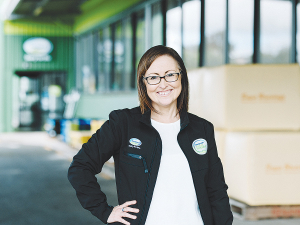Another Windfall for Fonterra Farmers, Unit Holders
Fonterra farmer shareholders and unit holders are in line for another payment in April.
 Anne Douglas says the co-op’s manufacturing team remains confident that product quality will not be impacted by the suspension of minor downgrades.
Anne Douglas says the co-op’s manufacturing team remains confident that product quality will not be impacted by the suspension of minor downgrades.
Fonterra is no longer docking farmer milk cheques for minor milk quality downgrades, within the Fat Evaluation Index (FEI) grading system, until further notice.
The co-operative says this is to help cashstrapped farmers, who are also facing feed shortages. This means Fonterra farmers can bring average feed costs down by including a bit more palm kernel expeller (PKE), which can impact milk fat composition and previously risked penalties. However, the co-op has asked farmers to be prudent in their use of PKE.
In an email to farmer shareholders two weeks ago, Fonterra Farm Source group director Anne Douglas says the suspension of minor downgrades will remain in place for as long as overall Fat Evaluation Index (FEI) levels are at a manageable level. She said Fonterra’s manufacturing team remains confident that product quality is not being impacted.
Fonterra introduced the FEI grading system in 2018, saying it would help farmers supply milk with the right fat composition. It said this was done to ensure that the co-op can continue to manufacture products that meet customer specifications and provide the best return to farmers.
A minor downgrade is the first step in the milk quality framework for milk that doesn’t meet Fonterra Farmers’ Terms of Supply.
The first two minors incurred in a month do not incur a financial deduction, but any subsequent minors attract a 5% deduction from the milk payment for that day.
For FEI a minor downgrade is a result between 9.01 - 11 (category C), incurring a 5% deduction. A major downgrade is between 11.01 – 16 (category D), incurring a 20% deduction.
Any results over 16.01 are given a reject milk quality rating.
The FEI downgrade system involves two tests: A rapid low-cost screen provides daily results to the farmer. The confirmatory test is more precise and is used to confirm downgrades.
Fonterra says there will be no confirmatory testing for category C results until further notice.
“We’ve made the decision due to several factors, but most significantly because of the ongoing adverse climatic conditions across the country,” Douglas explained. “The reduced level of feed availability resulting from these conditions and the economic conditions on farm.”
She says Fonterra is confident that the changes won’t impact product quality right now.
Fonterra has also undertaken to provide shareholders at least seven days’ notice before reintroducing minor downgrades.
Agrisea NZ has appointed Craig Hudson as it's new chief growth officer.
State farmer Landcorp, trading as Pamu, is a forecasting a full-year net profit of around $100 million.
Tony Aitken, chief executive of Ruralco, has been awarded the Excellence in Business Leadership Award at the ANZ Business of the Year Awards.
Global trade has been thrown into another bout of uncertainty following the overnight ruling by US Supreme Court, striking down President Donald Trump's decision to impose additional tariffs on trading partners.
Controls on the movement of fruit and vegetables in the Auckland suburb of Mt Roskill have been lifted.
Fonterra farmer shareholders and unit holders are in line for another payment in April.